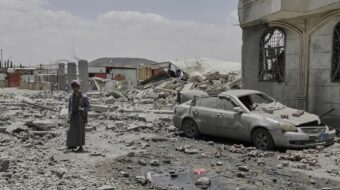WASHINGTON – Humanitarian groups warn of “catastrophic” civilian casualties if George W. Bush forges ahead with his “Shock and Awe” attack on Iraq in which cities will be struck with 3,000 missiles in the first 48 hours of war.
The Pentagon admits that the Iraqi army will deploy in Baghdad and other cities. To avoid heavy U.S. casualties in house-to-house combat, the Pentagon plans to hit Iraqi troops in their urban strongholds with a devastating aerial bombardment including the 21,500 pound Massive Ordnance Air Blast bomb. Use of nuclear warheads is not excluded.
Martin Butcher, director of Security Programs at Physicians for Social Responsibility (PSR), told the World, “It could mean multi-thousands of U.S. casualties and multi-tens of thousands of Iraqi civilian casualties.” That’s why PSR is struggling to avoid war, he added. “If the UN inspectors need months to complete the disarmament of Iraq, give them the time they need. All nations, including the U.S., should give up their weapons of mass destruction.” PSR sent a delegation to Baghdad in January and has issued a report warning of heavy civilian casualties if the U.S. attacks.
When first leaked to the media, the Pentagon’s “Shock and Awe” plan called for striking Baghdad with 800 cruise missiles in 48 hours, more than in the combined 43 days of Operation Desert Storm. But Gen. Richard B. Myers, chairman of the Pentagon Joint Chiefs, now says four times as many missiles will be needed to bring Iraq to its knees. Harlan Ullman, author of the “Shock and Awe” scheme, likens it to the atomic bombing of Hiroshima forcing Japan to surrender “in minutes.” Myers cautioned that the war this time will be “much, much, much different” from Desert Storm, predicting an “American attack would result in Iraqi civilian casualties” despite the military’s best efforts to prevent them.
A panel of former Reagan-Bush officials, headed by former CIA Director James Schlesinger and set up by the Council on Foreign Relations, announced Mar. 11 that a prolonged U.S. military occupation of Iraq by as many as 200,000 U.S. troops could cost $120 billion or more. They urged Bush to “fully describe to Congress and the American people the magnitude of the resources that will be required to meet the post-conflict needs.” Pentagon officials vowed to “put Iraqi soldiers to work and to pay the salaries of more than two million Iraqi civil servants” in rebuilding Iraq, The New York Times reported.
Meanwhile, the International Rescue Committee (IRC) and Refugees International released a joint statement Feb. 21 warning of “potentially catastrophic consequences” from war. They cited UN estimates of 1.5 million war refugees and 4.9 million in need of emergency food assistance on top of the 16 million already dependent on the UN’s “oil-for-food” program, likely to be wrecked by the war. A UNICEF survey says the lack of food and clean water from Desert Storm caused 500,000 “excess” Iraqi child deaths during the past decade due to typhoid, diarrhea, and other preventable diseases. A similar disaster looms as missiles once again target Iraq’s physical infrastructure, the relief groups predicted. “Yet very little money has been spent to pre-position supplies and relief workers to meet these humanitarian needs,” they charged. “The contrast between the military and humanitarian preparations is stark. The U.S. has already spent more than $2.1 billion to position troops in the Gulf. Yet last month, the UN High Commissioner was not able to raise $60 million to pre-position essential supplies for 600,000 refugees.” The Bush administration, according to many private aid groups quoted in a Baltimore Sun report Mar. 10, “has hindered preparations for assistance through its limited funding, delayed information about its aid plans, and its failure to grant licenses allowing them to enter Iraq to position supplies.” Asked about these charges, Melissa Winkler, a spokesperson for IRC in New York told the World, “That’s true. There’s been little progress.”
The author can be reached at greenerpastures21212@yahoo.com
PDF version of ‘Shock and awe would destroy Baghdad’









